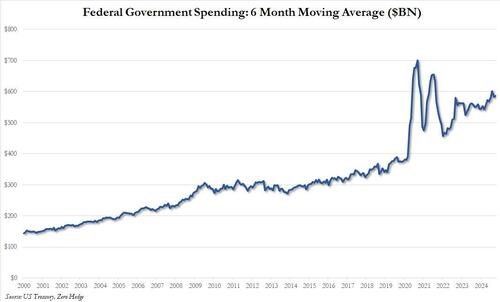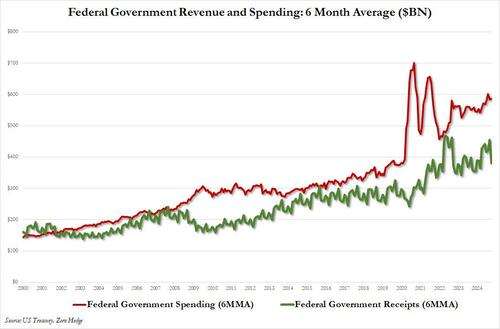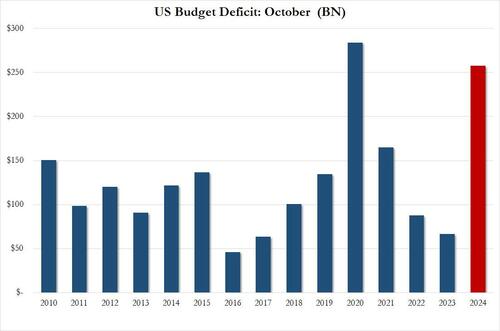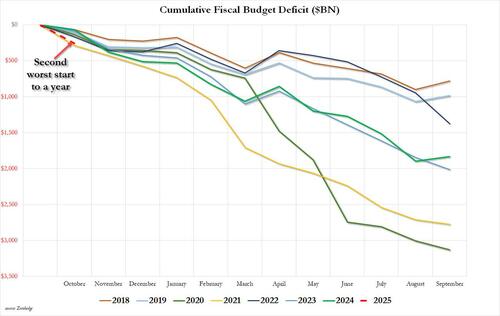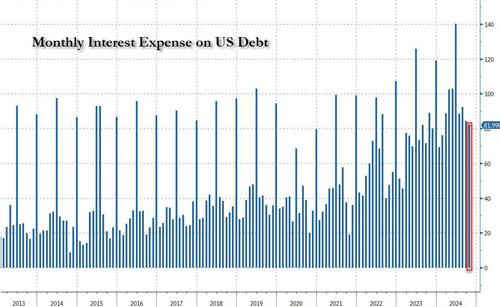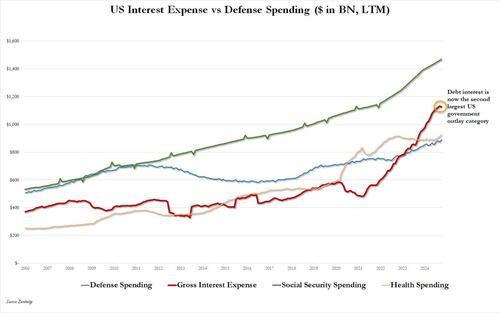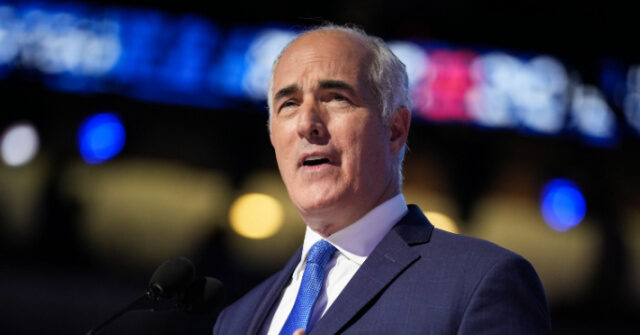JACK POSOBIEC and CLIFF MALONEY: ‘Of course the left is going to try and divide Trump and Elon’
“The left sees how effective and how impactful he’s been, and he’s got Trump’s ear helping make some of the most historic decisions for these Cabinet picks.”
‘Company’ Offers To Cryogenically Freeze Leftists For Four Years
‘Company’ Offers To Cryogenically Freeze Leftists For Four Years
Authored by Steve Watson via Modernity.news,
In an hilarious parody ad that is going viral, a fictional company called ‘Don’t Cry Cryo’ is offering to cryogenically freeze panicking leftists who can’t cope with president Trump’s election victory and wake them up after it’s all over.
The AI created ad, produced by Newzy, asks “are you distraught by the recent presidential election?” and offers to help, announcing “our expert team of cryogenic care providers can cryogenically freeze you until the Trump presidency is over.”
“No more crying, no more anxiety attacks, just blissful sleep until Trump is gone,” the ad further promises,” adding “it will be like his presidency never even happened.”
They even offer a JD Vance add on package!
There are more twists and turns in the ad, but we won’t give it all away.
Enjoy!
Don’t Cry, Cryo! 😂 Need a Break from Trump’s Term? Freeze Yourself for 4 Years! #Trump #ElonMusk #meltdowns pic.twitter.com/pEZXc0Hdqw
— newzy.com (@realnewzy) November 13, 2024
Who do you know that could use this service? @TheView @VP @jimmykimmel @HowardStern @Oprah ?
— newzy.com (@realnewzy) November 13, 2024
Lets send this supernova.
Super Bowl ad winner 😂
— 💪Make Men Again💪 (@southofcolumbia) November 14, 2024
And give Newzy a follow, they deserve it for this!
All of Hollywood and the media should be mandate to enroll in this.
— Bjl (@Bjl1044341) November 14, 2024
You legitimately won the internet today! Epic.
— Lying Liars Lying (@LyingLiars96) November 14, 2024
* * *
Your support is crucial in helping us defeat mass censorship. Please consider donating via Locals or check out our unique merch. Follow us on X @ModernityNews.
Tyler Durden
Thu, 11/14/2024 – 18:00
Sweden’s gender equality minister suffers from ‘phobia of bananas,’ refuses to have them anywhere near her: report
“It’s something that I get professional help with,” Paulina Brandberg said.
French prosecutors seek to ban Marine Le Pen from running again for president
“I think the prosecution’s wish is to deprive the French people of the ability to vote for whom they want,” Le Pen told reporters.
Three Key Energy Moves Trump Plans For His First 100 Days
Three Key Energy Moves Trump Plans For His First 100 Days
Authored by Simon Watkins via OilPrice.com,
-
Trump plans to prioritize increasing U.S. oil and gas production by removing federal drilling restrictions, which could lead to lower energy prices.
-
Trump may look to negotiate an end to the Russia-Ukraine war with a settlement that secures disputed regions for Russia.
-
Trump is likely to support Israel in taking action against Iran’s nuclear program, aiming to strengthen U.S.-Middle East alliances and counter China’s influence in the region.
Crucially for President-Elect Donald Trump’s second term in office, he will have considerable personal influence over the Senate (in which his Republican Party now holds a majority), and over the Supreme Court (where conservatives hold a six-to-three majority). His Party – and few can argue that it is now truly that – has also now secured a majority in the second of the two institutions of Congress, the House of Representatives, giving the re-elected President will have a once-in-a-lifetime chance to push through whatever legislation he wants, especially in the traditional honeymoon period of the first 100 days in office.
Three areas that he is likely to address in this period will have enormous ramifications for the global energy sector and the key countries that constitute its core.
One of these areas will be moves to increase the U.S.’s oil and gas production, as stated in several of Trump’s campaign speeches and documented in his ‘Trump Agenda47’.
Broadly, he will, “…set a national goal of ensuring that America has the No. 1 lowest cost of energy of any industrial country anywhere on Earth”. He added that to “keep pace with the world economy that depends on fossil fuels for more than 80 percent of its energy, President Trump will DRILL, BABY, DRILL”. He also highlights that he will, “end Biden’s delays in federal drilling permits and leases that are needed to unleash American oil and natural gas production”. This is likely to include the removal of much of the previous Presidential Administration’s pausing of key liquefied natural gas export permits. The likely net effect of this on oil and gas prices will clearly be bearish.
Another move Trump is likely to make in the first 100 days will be pushing for a negotiated settlement in the Russia-Ukraine War.
During his campaigning, the President-Elect repeatedly stated that he could end the war “in 24 hours” based on two key dealmaking tactics delineated in an interview with Fox News in July 2023. First, he would tell Russian President Vladimir Putin that if he did not make a deal with Ukraine then the U.S. would dramatically increase the scale and scope of its aid to the war-torn country. As a senior global security source who worked closely with Trump’s first Presidential Administration exclusively told OilPrice.com last week, this would include long-range sophisticated missiles being given to Kyiv and the permission to use them deep inside Russian territory that was ‘active’ in its war against Ukraine. Second, he would tell Ukrainian President Volodymyr Zelenskiy that the U.S. would withhold all aid to it unless Kyiv negotiated a deal with Moscow. The starting point for the deal itself that Trump has in mind, according to the source, is one in which Russia retains the original disputed territories of Luhansk and Donetsk, in addition to keeping Crimea which was annexed during the 2014 invasion. The other major territories in the southeast – Kherson and Zaporizhzhia – plus other areas in the northeast occupied by Russian forces, would form part of a demilitarised zone between the two nations.
Trump can see an additional benefit in this plan, which is based on the premise of countries ultimately being responsible for ensuring their own security. This is that the European countries of the North Atlantic Treaty Organisation (NATO) will infer from it that they must finally assume more of the spending burden of the security alliance with the U.S. to ensure the defence of their own borders. Trump has long made it clear that he thinks European countries should spend at least 2.5% of their annual gross domestic product (GDP) on defence, with the U.S. having spent 3.6% of GDP in this way last year. Over the same period, only Greece managed this minimum 2.5% requirement (at 3.23%) with Great Britain second (at 2.33%). The longstanding de facto economic leader of the European Union of 27 countries was near the bottom of the list, at just 1.52%.
That said, the combination of a negotiated settlement ending the Russia-Ukraine War and the implicit obligation to spend at least 2.5% of GDP on defence every year might prompt a gradual fracturing in the already uneasy political cohesion of the European Union towards punishing Russia for its aggression against Ukraine. Many European economies have buckled in recent years from the effects of Covid, surging inflation caused by soaring energy prices after Russia’s invasion of Ukraine and competition from China in key sectors. These elements may convince any new German government (following the recent collapse of its governing coalition) that resuming the cheap and plentiful supplies of energy from Russia upon which it built much of its economic wealth over the previous two decades is a necessary step to its financial recovery. Russia, for its part, will be more than happy to accommodate it, beginning with the extension of gas exports to Europe via Ukraine at the end of this year.
The third measure that Trump is likely to take in his first 100 days as President will be giving the nod to Israel to do whatever it wants with Iran.
It should be remembered that it was Trump’s belief that Iran was using the ‘Joint Comprehensive Plan of Action’ (JCPOA, or colloquially ‘the nuclear deal’) cynically to quietly build up its nuclear weapons programme from money accrued through increased trade and investment made possible by the deal, as analysed in full in my latest book on the new global oil market order. That was why the U.S. unilaterally pulled out of the deal in May 2018. It was also Trump who said on 4 October that “Israel should hit the [Iranian] nuclear [facilities] first and worry about the rest later.” He added – in response to Biden’s flat ‘no’ on Israel striking Iran’s nuclear sites — “That’s the craziest thing I’ve ever heard. That’s the biggest risk we have. The biggest risk we have is nuclear … Soon they’re going to have nuclear weapons. And then you’re going to have problems.” Removing – or at least severely downgrading – Iran’s nuclear threat would allow the Trump Presidential Administration to reassert its authority with several major Arab states, most notably Iran’s historical nemesis in the region, Saudi Arabia. This could be done through the re-start of the relationship normalisation deals that the previous Trump government orchestrated between Arab states and Washington’s principal Middle Eastern ally Israel that began in 2020 with the UAE, as also detailed in my latest book. The resuscitation of these types of deals is something Trump has already signaled as being a key priority for his new Administration. Doing this, in the aftermath of a major Israeli strike on Iran’s nuclear weapons development programme, would have the corollary benefit for Trump of derailing China’s efforts since 2018 especially to replace the U.S. as the leading superpower in the vital global oil and gas region of the Middle East. It would also enable the U.S. to resume the sort of cooperation with Saudi Arabia and OPEC that kept oil price within the ‘Trump Oil Price Range’ for virtually the entirety of his previous presidential term.
Tyler Durden
Thu, 11/14/2024 – 06:30
What Trump’s New Political Appointees Are Telling Us
Ryan and Tho examine the role that ideology and interest groups will have on Trump’s administration and on his political appointees.
Virginia Family’s EZ-Pass Charged $576 After Driving RV Just 45 Miles On State Toll Road
Virginia Family’s EZ-Pass Charged $576 After Driving RV Just 45 Miles On State Toll Road
It’s easy to laugh off people who constantly complain that the government is watching their every move and has hands in their wallets. Then, you stumble upon a story like Jeff Landry’s.
When Landry set off for a camping trip with his family near Virginia’s Luray Caverns in early October, he expected to pay some tolls – especially because he had his RV.
Traveling from Falls Church with his wife and youngest child following in a minivan, they took I-66’s express lanes during peak hours, expecting to pay $30 or so each way in tolls. But to his surprise, when the EZ-Pass charges appeared days later, the bill totaled an eye-popping $569.50 for the roundtrip, according to MSN/MotorBiscuit.
At first, Jeff thought the bill was a mistake, but after checking the toll website, he realized it was accurate.
The MSN/MotorBiscuit writeup says that his three-axle RV was charged a premium due to its size, but $569.50 for a 22-mile round trip felt excessive to him. He hadn’t anticipated how much dynamic pricing could drive up tolls for larger vehicles during peak hours.
It turns out…the I-66 express lanes, managed by I-66 Express Mobility Partners, adjust toll rates based on traffic demand, charging drivers more to bypass congestion.
Larger vehicles, like Jeff’s 1997 Holiday Rambler RV, incur even higher tolls due to their size and road impact. According to a toll operator’s spokesperson, Jeff’s RV wouldn’t even qualify to use certain other toll lanes in Virginia, so the high charges are firm.
The writeup notes that drivers unfamiliar with toll pricing can easily misjudge costs, as Jeff did.
It says to avoid similar surprises, plan your trip to avoid peak hours, when toll rates are highest; traveling during off-peak times can significantly reduce toll charges. Additionally, check your vehicle’s toll classification, especially if you’re driving a larger, multi-axle vehicle, which typically incurs higher tolls. Lastly, explore alternative routes.
While non-express lanes may add some travel time, they can save large vehicle drivers hundreds of dollars. For Jeff, the express lane shaved only 20 minutes off his trip—an advantage that, in retrospect, didn’t justify the steep toll.
Or, maybe just stay home next time…
Tyler Durden
Wed, 11/13/2024 – 23:00
Schoolhouse Limbo: How Low Will Educators Go To ‘Better’ Grades?
Schoolhouse Limbo: How Low Will Educators Go To ‘Better’ Grades?
Authored by Vince Bielski via RealClearEducation,
Maryland’s new education chief, Carey Wright, an old-school champion of rigorous standards, is pushing back against efforts in other states to boost test scores by essentially lowering their expectations of students.
States, including Oklahoma and Wisconsin, are making it easier for students to demonstrate on annual assessments that they are proficient in math and English after a decade of declining test scores nationwide. By redesigning the assessments and lowering the so-called “cut scores” that separate achievement levels such as basic, proficient, and advanced, several states have recently posted dramatic increases in proficiency, a key indicator of school quality.
Wright warns that lowering the bar on proficiency can create the public impression that schools are improving and students are learning more when, in fact, that’s not the case.
“You can make yourself look better to the public by lowering your cut scores,” Wright, the Maryland state superintendent of schools, told RealClearInvestigations in an interview. “But then you are not really measuring proficiency. My position is no, no, no. Parents and teachers need to know if their children are proficient or not.”
As most public schools continue to deal with the related crises of learning loss and chronic absenteeism years after COVID, Wright says now is the worst time to lower expectations of students, which can stifle the impetus to improve. In other moves to accommodate struggling students, districts and states have reduced graduation requirements and inflated grades with policies that ban failing marks. The best evidence comes from studies in Washington and North Carolina showing that grades have held steady at their pre-pandemic levels even though students are learning much less.
“With grades and assessments, the education system seems to be sleepwalking into a policy of ratcheting expectations down to better reflect what today’s students can do, rather than doubling efforts to help get students to where they need to be,” said Michael Petrilli, president of the Thomas B. Fordham Institute, which advocates for high academic standards.
Wright, who took over Maryland schools this summer, is refusing to backpedal on standards in a state that plunged from the top to the bottom in U.S. performance over the last decade. The superintendent says she aims to improve Maryland’s declining proficiency rates the hard way by making academic standards more rigorous in all content areas. As students learn more in class, the theory goes, they should become more proficient on state tests.
But a strategy that asks more of teachers and students is never an easy lift in districts that often resist top-down calls for change. Without direct control over school districts run by local boards, state superintendents like Wright must depend on the ability to inspire principals and teachers to follow their lead and meet inconvenient truths head-on.
Wright has done it before. As the state superintendent in Mississippi a decade ago, she collaborated closely with districts in lifting content standards and provided support to completely revamp literacy instruction in what was the worst-performing state in the union. Student proficiency soared without lowering cut scores. Educators called it the “Mississippi Miracle.”
“If you set the bar low, that’s all you are going to get,” Wright said. “But if you set the bar high for students, and support teachers and leaders, it’s doable.”
Lowering Cut Scores, Boosting Proficiency
Each state controls its own definition of proficiency and how students can achieve the all-important marker of academic success. They set their own content standards that detail what students need to know in each grade, write their own tests to determine if they are proficient, and devise their own cut scores.
The undertaking is more art than science. There is no accepted single definition of what makes a student proficient. States mostly aim for grade-level proficiency, or what the average student can do, based on their own content standards. A handful of states shoot higher, approaching a more rigorous definition of proficiency spelled out by the National Assessment of Educational Progress (NAEP), commonly known as the Nation’s Report Card.
By moving the bar on tests and cut scores, education officials have instantly raised or lowered proficiency rates. Over the years, some states have added enough rigor to allow only a third of students to show proficiency while others have reduced it to ensure that the vast majority perform well, Marianne Perie, who has helped more than a dozen states develop assessment methods, told the New York Board of Regents last year.
Today, states are lowering the bar and lifting proficiency rates. “Oklahoma just lowered their cut scores and Wisconsin is another one that ended up with less rigorous cut scores,” Perie told RCI. “If more kids are proficient this year compared with the previous years, it indicates that cut scores are less rigorous or that kids learned a lot more over the last year.”
High Standards Fall in Wisconsin
Wisconsin, like most states, has experienced a big drop in proficiency. In 2017, 44% of public school students were deemed proficient in English. That percentage fell in 2018 and 2019 and then plunged in the early years of the pandemic before recovering a bit to 39% in 2023.
This year, Wisconsin rolled out its new test and cut scores. State Superintendent Jill Underly was transparent about the changes, explaining in October that the redesign was meant to fix a problem created a decade ago when Wisconsin and other states aligned their cut scores to an “extremely high” level used by NAEP, reducing Wisconsin’s proficiency rate in the years that followed. Underly wrote that Wisconsin’s new grade-level cut scores better reflect the actual proficiency of students, making results easier for families to understand.
What families saw was a dramatic boost in English proficiency to 48% this year – a nine percentage-point gain over 2023 – due to assessment changes that had nothing to do with classroom learning.
To be sure, the Wisconsin Department of Public Instruction didn’t tout the 2024 results. It announced that they shouldn’t be compared to prior years since testing methods changed. Still, families who don’t follow the fine print of assessments may be left with the impression that Wisconsin schools are performing much better this year.
Paul Peterson, a prominent Harvard professor of education policy who has tracked changes to state proficiency levels, says politics seems to be a driver in the lowering of testing rigor. “Student performance is falling so I would imagine the pressure on states to rethink standards must be considerable,” Peterson said. “Officials want to show that they are spending the public’s dollar well, and that students are learning.”
No Notice in Oklahoma
In Oklahoma, a similar assessment revamp unfolded this summer but with a controversial twist: State leaders in Oklahoma didn’t inform school districts or families that they had lowered the bar before releasing the test results in August, according to reports in the local media.
When school districts saw the results, principals and teachers were in disbelief over the huge increase in performance. In fourth grade English, for instance, 47% of students reached proficiency – an extraordinary 23-percentage-point jump compared to 2023.
Later in August state Superintendent Ryan Walters, a conservative who has been under fire for insisting that public schools teach the Bible, admitted that the state changed its assessment regime without publicly announcing it. Republican state lawmakers issued a statement criticizing Walters for “putting a false narrative out there” about a jump in test scores. Oklahoma’s Department of Education didn’t respond to a request from RCI for comment.
“I believe in transparency and communication,” said Perie, the testing expert. “Oklahoma was the only state where it seemed like they were hiding the changes.”
New York Denies Lower Standards
As in Wisconsin and Oklahoma, New York’s retooled content standards, assessments, and scoring also produced higher proficiency rates.
A New York education official told RCI that the goal was to determine what should be expected of today’s students and how to evaluate their proficiency in various subjects using the new content standards. New York saw a dramatic 13-percentage-point increase in math proficiency and a small boost in English in 2023, the year the changes were implemented.
Officials in New York and Wisconsin are adamant that the updated assessments don’t amount to a lowering of academic standards even though proficiency rates jumped. The New York official added that while several factors impact student achievement from year to year, instruction is one of the most highly related attributes.
“It is incorrect and irresponsible to derive from this that the standards have been lowered,” the official said in an email.
Petrilli of the Fordham Institute calls such explanations from state officials double speak. “By definition these states are lowering standards for proficiency because it’s easier for students to meet the standard than it was before,” he said.
Wright’s ‘Mississippi Miracle’
Education experts say Wright’s tenure as the state superintendent in Mississippi offers a lesson to states struggling with low proficiency rates today: Even in the worst of times, Wright showed, states can raise their expectations of students and get results.
When Wright took over Mississippi schools in 2013, they were at the very bottom in performance nationally. A mere 21% of fourth graders were proficient in reading, according to NAEP. Educators in the South would say, “At least we are not as bad as Mississippi.”
The decade before the pandemic was a time of rising expectations in public education. With Wright in charge, Mississippi joined half of the states in raising the bar for fourth-grade reading proficiency between 2013 and 2019.
The lifting of expectations was relatively easy. It’s policy making. The tough part for state superintendents was implementing changes in schools to reach those higher goals. For the most part, the higher bars didn’t translate into higher levels of proficiency by 2017, according to research by Daniel Hamlin at the University of Oklahoma and Harvard’s Peterson.
There are only theories as to why: After the Great Recession of 2009, school funding declined. The Obama administration relaxed federal accountability measures put in place by President George W. Bush’s No Child Left Behind reform of 2002. The advent of smartphones became a major distraction for students.
Mississippi was a notable exception. Its fourth-grade reading proficiency jumped by 11 percentage points from 2013 to 2019, rising to a top 20 performer in the U.S., according to NAEP. In math, the increase was equally impressive.
Wright got results the old-fashioned way, with a tenacious focus on improving proficiency for all students, including those living in poverty, says Washington Cole, then her chief of staff and now a district superintendent in Mississippi. To get there, Wright rolled out a literacy program that was backed by decades of research and, crucially, provided teachers and administrators with extensive training in the model and sent coaches into the lowest-performing schools. “The professional development was a huge part of it,” Wright said.
Wright also toughened the district grading system that provided public accountability. When districts earned an “A” for performance, they were publicly celebrated by community members and lawmakers, adding to the incentives for other districts to improve. Over a decade, Wright’s team transformed Mississippi into an unlikely national K-12 success story.
“Dr. Wright set high expectations and her hard work and determination were very infectious with everyone. She was amazing,” Cole said. “I have no doubt that she will do the same thing in Maryland.”
Maryland Tries a Turnaround
Wright has her work cut out for her. After a decade of decline in Maryland, 48% of students are proficient in English and 24% in math.
In Baltimore City, where almost all students are black or Latino, the numbers are tragically low. Only 6% of middle and high schoolers are proficient in math. More than 40% of Baltimore City students were chronically absent last year, according to a district estimate, well above the national average. Students can’t learn if they don’t show up.
None of this seems to faze Wright, who assumed permanent leadership of Maryland’s schools in July. In returning to her native state, where she earned her doctorate in education and began her career as a teacher and administrator, Wright has wasted no time in setting a very ambitious goal.
“In the next three years we are expecting a 5-percentage point increase in proficiency each year in English and math,” she said.
To achieve that goal, Wright appointed a task force of teachers, leaders, experts, and parents to quickly recommend changes to the state’s accountability system, which she discovered painted a very rosy picture for the public. It was giving high marks to three-quarters of all schools despite their low proficiency scores. Wright wants the new system to provide school leaders with clearer measurements on a range of topics, such as the pace of student growth and graduation rates, so they can target their weak areas for improvement.
“Superintendents take a lot of pride in their ratings,” Wright said. “They want to be that district that gets recognized.”
Major changes are also coming to classrooms. Wright’s new early literacy policy, which won state board approval in October, details expectations for instruction based on the science of reading and teacher training in an attempt to lift test scores that have fallen to 41st in the country.
The biggest change in policy puts an end to social promotion. Districts with parental consent will be able to hold back third graders who don’t meet literacy standards rather than promote them to fourth grade, where they will continue to struggle to read, hampering their future performance. It’s the kind of bold change that Wright wasn’t hesitant to push despite opposition from some board members and families concerned about the impact on disadvantaged students.
It worked for Wright in Mississippi, producing a very large increase in reading performance by sixth grade, according to researchers.
“Putting a stake in the ground and saying we are not just going to move kids along if they haven’t learned to read by grade 3 is very powerful and much needed for our education system,” said Joan Dabrowski, the chief academic officer of Baltimore City Public Schools. “Dr. Wright is very clearly telling the districts they need to prioritize this policy and the state will be monitoring districts so there is a lot of accountability.”
Will the policy work? Dabrowski says it depends on the support teachers and principals receive from Wright to make the difficult changes over several years. “I like everything in the policy, but there are lots of points where implementation could go well or not go well,” she said.
Illinois Next to Lower Cut Scores
In June, Illinois made clear that it plans to boost proficiency too by following the approach of Wisconsin. Illinois Superintendent Tony Sanders said in a report that his state has one of the toughest definitions of proficiency in the nation. He said students who are on track for college could be mislabeled as not proficient, sending a wrong message to their families.
To fix this, Illinois is planning to adjust its assessment methods by 2025, which will likely boost the state’s proficiency rates.
If Wright fails in Maryland, would she consider following Illinois and other states in easing the rigor of assessments?
She scoffed at the idea.
“When you look over the last decade of dropping test scores, now is not the time to be lowering the bar,” she said. “If you don’t set high expectations, you’re never going to achieve the kinds of goals that you want to achieve. And in our business, it’s called student learning.”
Tyler Durden
Wed, 11/13/2024 – 18:25
US Deficit Explodes: Blowout October Deficit Means 2nd Worst Start To US Fiscal Year On Record
US Deficit Explodes: Blowout October Deficit Means 2nd Worst Start To US Fiscal Year On Record
It is only fitting that the twilight days of the Biden admin would exhibit more of the same fakeness that defined not only all of the past four years, but certainly the fakeness of that Kamala Harris presidential campaign which had a billion dollars a month ago and ended up in failure, broke and in debt. We are talking, of course, about the relentless debt-funded spree that somehow became synonymous with economic success in the US.
According to the latest Treasury data released today, in October – the first month of fiscal 2025 – the US spent a massive $584.2 billion, a 24.3% increase from the prior year, and a record government outlay for the month of October. On a trailing 6 month moving average basis, to smooth out outliers months, the spending hit $586 billion, effectively at an all time high with just the record spending spree during covid pushing government spending higher.
Key drivers of the deficit widening included outlays in the Departments of Health and Human Services and of Defense, up 12% and 13% respectively, adjusted for calendar differences. Health spending alone jumped by $62 billion compared with the same month last year.
At the same time, the US government collected just $326.8 billion in taxes, down a massive 19% from the $403.434 billion last October, and down even more from the $527 billion in tax receipts in September ’24. As shown in the next chart, while spending continued to grow exponentially, tax receipts have flatlined, and the 6 month average in October was just $380 billion, the same as three years ago!
It’s actually worse than it looks: according to the Treausry, last year’s October tax receipts were unusually higher due to deferred tax receipts that were received that month from companies and individuals affected by disasters including wildfires in California. Taking that into account, the budget deficit this October would have been 22% higher, a Treasury official said.
In any case, netting the two means that the US deficit exploded in October to a staggering $257.5 billion, and even though this included several calendar adjustments – which explains the freak September surplus which as we said was due to calendar effects – the number was not only $25 billion more than consensus estimates of a $232.5 billion deficit, it was a staggering 4x bigger than the $66.6 billion deficit in October of 2023. Worse, it was the second highest October deficit on record, and only the budget busting October when the US was spending to prevent an all-out economic implosion, was bigger.
And putting the deficit in context, October – the first month of the fiscal year – was just shy of the biggest deficit start to a year for the US Treasury on record, with just fiscal 2021 (i.e. October 2020) bigger.
In contrast with what has been a terrifying trend for some time now, the Treasury’s debt-servicing costs only rose slightly in October. Gross interest costs totaled $82 billion in October, unexpectedly down $7 billion from $89 billion in the same month a year before.
The drop meant that LTM interest spending posted the first (very modest) sequential drop – from $1.133 trillion to $1.126 trillion – since August 2023.
That’s because the weighted average interest rate for total outstanding debt by the end of September was 3.30%, at roughly 15-year highs, but down slightly from the month before, the second monthly decline.
However, don’t expect this decline in interest spending to persist because even though the Fed has cut rates twice since September, this has been more than offset by the surge in debt which at last check was just shy of $36 trillion, and unless Elon’s Department for Government Efficiency (DOGE) manages to somehow slash trillions in both spending, this is what US debt will look like for the next few years, guaranteeing that interest on said debt will very soon become the single largest spending category for the US government.
It’s either going to work or it’s not. Here is the alternative https://t.co/cHZA2wHnPB pic.twitter.com/LMEI4tISZL
— zerohedge (@zerohedge) November 13, 2024
The mindblowing figures illustrate the monumental challenge for Trump and all those promising to rein in US debt, which has exploded to 120% of GDP after four years of Biden’s “drunken-sailor” spending ways. Last night Trump tapped Elon Musk and Vivek Ramaswamy to look at ways to cut spending. Thursday’s figures showed the bulk of the outlays are in areas that are bound to be politically challenging to address, in other words, any cuts even remotely close to the $2 trillion suggested by Vivek would lead to a revolt.
Tyler Durden
Wed, 11/13/2024 – 18:00
JACK POSOBIEC: ‘The regime still exists’
“The military-industrial complex does not want to nominate someone who is best known for being a veterans advocate.”









